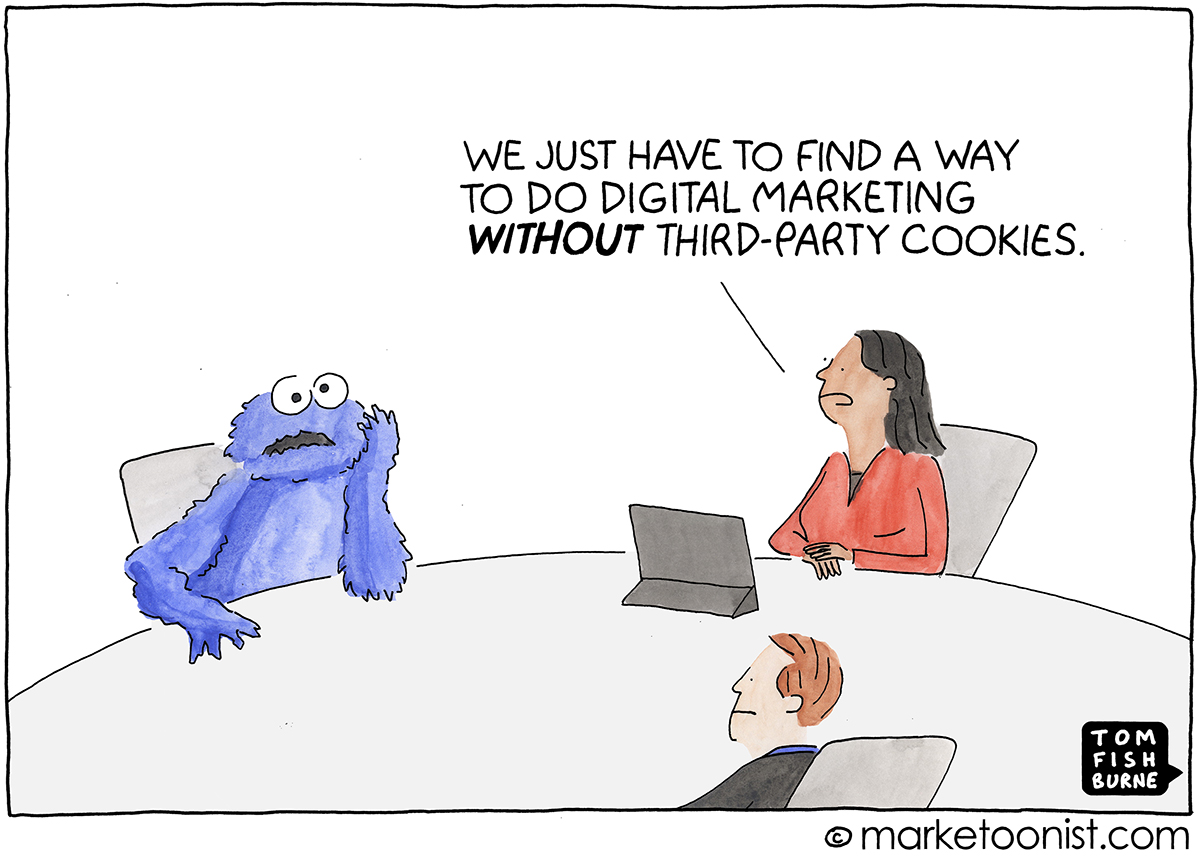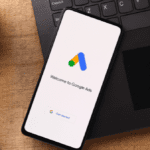 Reading Time: 6 minutes
Reading Time: 6 minutesImage by Tom Fishburne via Marketoonist.
Anyone paying attention to the latest digital trends—especially as they apply to transparency and user privacy—has anticipated the news for some time; third-party cookies will not be around for much longer. Following the lead of Firefox and Safari, Google, on behalf of its Chrome browser- announced in early 2020 that it would be phasing out third-party cookies that track user behaviors across multiple platforms on the internet.
The crackdown on this type of user tracking was likely inevitable in the current sociological and political climate. To that end, there has been growing distrust between internet users and certain digital advertisers for years. A Pew Research study found that 72% of people feel that everything they do online is being tracked by someone, most likely big tech companies or mega-advertisers – and they don’t like it. In fact, 81% of the people surveyed felt that the potential risks of an invasion of privacy outweigh the benefits of targeted marketing.
What Is the Time Frame of the Cookie Phase-Out?
It sounds like the big names in tech and advertising are listening. Actual changes, however, seem to be trickling in. In fact, we are currently over a year into what Google announced would be a two-year phase-out of third-party cookies.
Google has referred to these intervening steps as creating a “privacy sandbox” to protect a user and their information when they are browsing the internet. Currently, the internet giant feels that this is the best way to balance advertising with a user’s privacy, with the eventual goal of total phase-out before the end of 2021.
The Difference Between Third-Party and First-Party Cookies
It is important to note that Google is not cracking down on all cookies—first-party cookies will continue to function the same way they do today. With the help of first-party cookies, when a user visits a website they’ve previously visited, the site recognizes the device and recalls prior interactions. As a result, users will find the cookies have stored a variety of preferences including language, shopping cart contents, usernames, and more. A first-party cookie identifies each unique user and remains on the user’s device until they delete it.
The use of these cookies benefits both the person browsing the website and the website owner. The former benefits from ease of use and the website’s ability to provide services, information, and advertisements they find relevant. The latter can target the user with relevant ads more likely to lead to conversions and gather useful data in one fell swoop.
First-party cookies have the potential to tell a business a great deal about their user (and vice versa) but are often underutilized because of the negative focus placed on third-party cookie behavior. Users have responded negatively to cross-domain tracking, intrusive ads, and other features of third-party cookies, leading many to utilize Chrome’s Incognito browsing feature.
Businesses that were holding out for a feasible alternative to track individual users’ internet activity across multiple platforms are out of luck. Google has announced that no alternative will be put in place to these third-party cookies, citing privacy concerns. It believes that the privacy of the user is more important, and that third-party tracking without consent is too invasive.
What Does This Mean for Your Business?
If you are one of the rare businesses that rely solely on first-party cookies, hardly anything must change. In fact, with the phase-out of third-party cookies, it is likely that you will find yourself with even more tools to use your first-party data in the future.
However, if your business model relies heavily on third-party cookies and cross-site advertising information, you will need to make substantial changes to your strategies. Advertising for your business means that you will likely need to rely on the Federated Learning of Cohorts (FLoC). FLoC can utilize user-based information to target ads in a way that better protects the privacy of a unique user.
FLoC can target the user with ads based on browser history, forming what is called a “Cohort ID” in combination with similar users. This Cohort ID must encompass at least 1,000 other people before it becomes viable for use. A group of this size will mask the identity of the single unique user and instead target ads to a group sharing similar interests. Therefore, a Cohort ID will not rely on tracking a single users’ activities across many sites but will group users together who have similar online behaviors. The main takeaway is that no business can access a user’s unique identity and use it to target advertising, but algorithms can still target relevant ads to that user and others like them with surprising precision.
Let’s look more closely at the specific ways these changes will affect your business and marketing efforts moving forward.
Claim Your Free Paid Media Consultation
Contextual/Keyword Targeting Demands Your Attention
To stay relevant, you will need to shift away from relying on constant, precise information about what each user does across the web. Instead, devote time to examining the types of content users regularly interact with and respond to and make your site relevant for them. This contextual targeting will cause businesses and marketers to put much more emphasis on the relevant keywords a user searches, as well as the topics they often respond to.
By marketing to users who search keywords and topics relevant to your products and services on business pages much like your own, you can target a valuable audience without third-party cookies. It is an understatement to say that businesses will have to utilize every tool available to optimize their search engine results to enhance contextual/keyword targeting. Search engine optimization (SEO) will lead the way for advertising in this new third-party-cookie-less world.
First-Party Data Will Matter More Than Ever
Because you will no longer be able to ascertain the content the user consumes over many diverse sources, you will have to gain and analyze as much data as they can from how the user interacts with their unique content on your own site. The good news is that, when done correctly, data from interaction with quality content can be more telling than studying a single user’s behavior, where click baiting content often skews browsing history.
Users often click on clickbait only to realize it is irrelevant content and move on, but it creates an unrealistic, third-party representation of who that user is. While thoughtless clicks can lead to junk data for marketers, you have a wealth of first-party user data from your own site at your fingertips. Are you capturing it effectively? More importantly, are you taking the time to analyze and utilize it as you should?
Your Business Must Keep Its Content Relevant
While FLoC will help ad targeting in the privacy sandbox, information from Cohort IDs is only effective while the user is interacting with your website. This means that your content must maintain high quality standards and stay relevant. Gone are the days when you can rely on other businesses to send you data on your user’s preferences.
A trend many experts anticipate after third-party cookies exit the picture is businesses requiring registration before a user can consume their content, enhancing the scope of first-party data. In fact, some may even create paywalls for their most relevant and sought-after content. Registering for access to quality content is a tradeoff that many users will be willing to make to ensure constant access free from third-party monitoring, but you’ll need to follow through with content worth the user’s time, effort, and money.
Marketing Agencies Will Become More Relevant
If the key to the new virtual advertising world is first-party data, then you must use all the data you collect in the most efficient manner possible. However, many business owners and marketers are unsure about the variety of analytics and data collection tactics available to help them take this step. If this describes you, or if you’re uncertain how to take advantage of the new ways to target ads, marketing agencies will prove an asset.
Since the announcement, marketing agencies have uncovered great opportunities for putting these ever-increasing amounts of first-party data to use. In fact, they’re shaping how we look at data collection in this post-third party, more transparent landscape. New innovations are on the horizon, both to help you target your efforts towards users who will convert and to ensure the consumer feels secure—digital marketing agencies will be on the forefront of the new movement.
Moving Towards a New Future
Many business owners had knee-jerk reactions to Google’s announcement that they would phase out third-party cookies. Some accused the company of destroying an advertisement infrastructure that many businesses relied on for profit. However, with advancements in FLoC and other ways to utilize user interaction with business’s own websites, these fears seem unfounded.
A balance between personalization and privacy appears to be a compromise users are willing to make. A recent Harris Poll revealed that as many as 63% of digital consumers expect some level of personalization (read: first-party cookies) as a standard part of their internet experience. Most importantly, however, they expect to retain the choice whether their activity is tracked, whether they see relevant ads, and whether they receive a personalized experience, or not.
Instead of finding a workaround to replace third-party cookies, today’s marketers and business owners need to focus on finding ways to make their advertising less invasive and more relevant. If this is the case, consumers will be much more likely to choose to allow it to improve their digital experience. There is plenty of room to grow, even within a privacy sandbox.
At Vizion Interactive, we have the expertise, experience, and enthusiasm to get results and keep clients happy! Learn more about how our status as a Google Partner, along with our PPC Management, Google Shopping Ads, Social Media Advertising, Amazon Advertising, and other Paid Media services can increase sales and boost your ROI. But don’t just take our word for it, check out what our clients have to say, along with our case studies.



